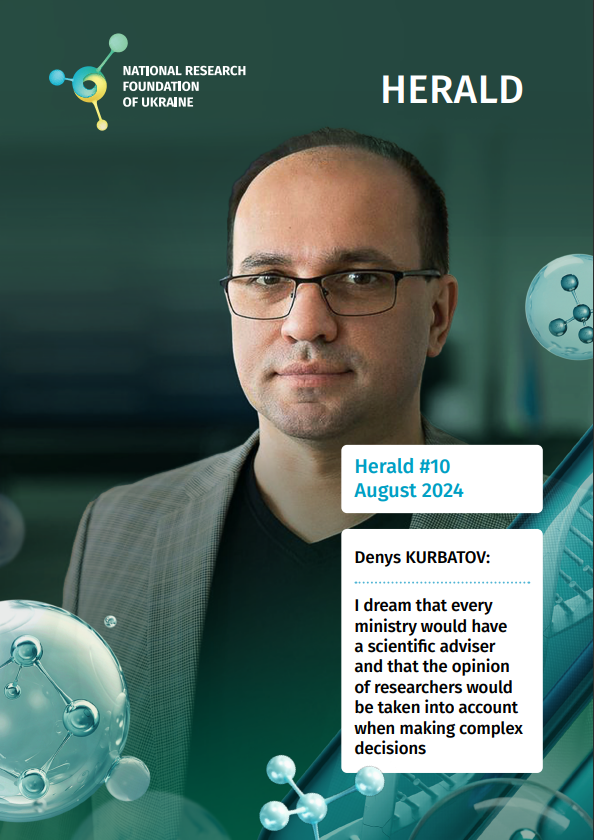
Strong science, a significant increase in funding (in particular grants), research commissioned by governmental authorities, scientific advisors in ministries, and implementation of results in the real economy and social practice. Every researcher’s dream is to make this a reality.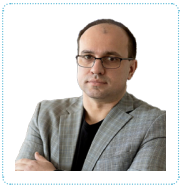
What needs to be done to make changes in the scientific field happen? Where to get resources for change? Is the research community ready for change?
We are talking about this with Denys KURBATOV, Deputy Minister of Education and Science of Ukraine.
– Dr. Kurbatov, it has recently been a year since you joined the team of the Ministry of Education and Science of Ukraine as Deputy Minister. Prior to that, you worked at a classical university whose researchers are well known and recognized in the research community. Tell us, what was your motivation for working in this position? What changes did you want to implement?
– I have been working in the scientific field for quite a while. I worked in the research department of Sumy State University where we helped researchers find funding, grants, and orders from businesses. I am convinced that if customers need research performed by scientists, this is one of the criteria that science in institutions of higher education is effective.
Unfortunately, we have constantly faced difficulties in conducting research that depended not on the university but on external circumstances. These include the fiscal burden on research projects, problems with banking deficiencies (when funds from foreign partners or Ukrainian businesses are queued for payments at the State Treasury Service of Ukraine), and lengthy procedures of procurement of materials, reagents, equipment, etc.
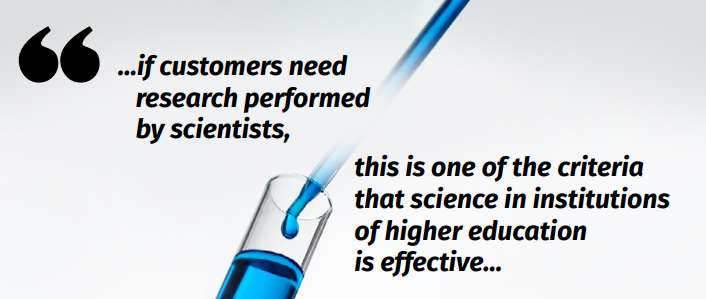
In general, management in the scientific field was not friendly to researchers. The desire to change this situation was my motivation to start working for the MES. This decision was not an easy one for me but after weighing the pros and cons, I decided to give it a try.
I realized that we needed to build an ecosystem where researchers could use their knowledge and work for the benefit of themselves, their research institution, and Ukraine.
At that time, I did not have a ready-made action plan with a detailed implementation algorithm. But I had a clear vision of things that needed to be changed.
– What difficulties did you face in your first year? What challenges were unexpected?
– There were a lot of difficulties and many of the challenges were really unexpected.
For example, it was unexpected to face the unwillingness of the research community to accept changes. Everyone said that the things could no longer be as before, but any proposal for change was met with criticism.
Another problem was that we had to build a team within the Ministry almost from scratch. We have changed the organisational structure, reformatted directorates, departments, and expert groups. We want people to work to achieve a result. For example, if it is planned to launch funding for research in an institution of higher education in January, it must happen in January, not in February, March or April.
And we succeeded: the university research funding programme was launched in January 2024. Researchers were able to start research at the beginning of this year. However, there is still a lot of work to be done in this area.
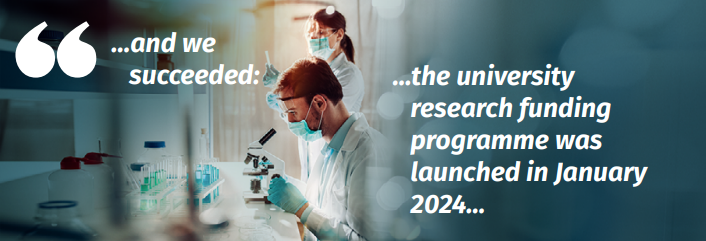
– In 2022, funding for the NRFU grant projects was suspended. In order to raise funds to support Ukrainian researchers, the Foundation began looking for international partners. But it was not easy to launch joint calls, as the regulatory framework did not provide for this. Looking back, what did it cost to rectify this situation?
– Predictably, it cost nerves, time and effort. We were aware of this problem. We knew that for almost a year the funds of the Swiss National Science Foundation (SNSF) could not enter Ukraine because there were no relevant amendments to the government’s resolution. The new team of the MES immediately began to address these issues. As early as in August 2023, a government resolution was adopted and the NRFU was able to ‘unfreeze’ the implementation of these important projects.
– The new MES team is actively helping to develop the capacity of the NRFU (the Horizon Europe Office in Ukraine was established, amendments to the regulations governing the NRFU were made, etc.). What plans does the MES have to strengthen this capacity in the near future?
– The Foundation is one of the main specialized institutions in Ukraine that provides grants for research and developments on the basis of open competition. Similar calls are also funded by the Ministry of Education and Science of Ukraine and the National Academy of Sciences of Ukraine, but the NRFU is still the main player. The Foundation’s capacity needs to be developed and its opportunities need to be expanded.
We have launched a working group on the development of the NRFU’s capacity, diversification of its functions and de-bureaucratization of its procedures (in accordance with the MES Strategic Plan until 2027). The group includes representatives of the Foundation and the research community (e.g. representatives of research institutes and universities that used to be grantees of the Foundation). This group formulated a clear list of issues to be addressed.
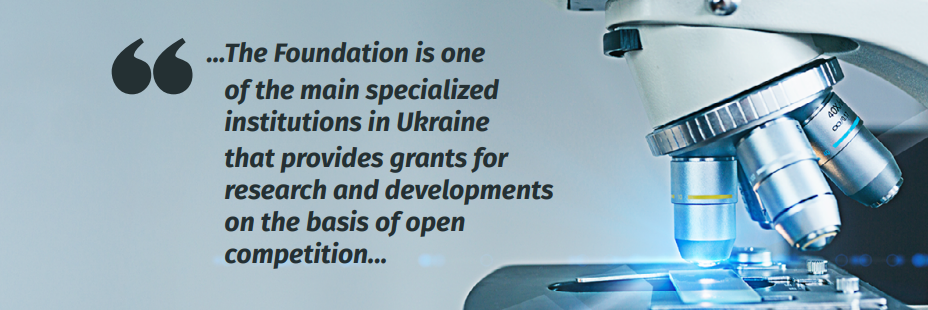
We held a series of meetings and discussions, and I am grateful to the Foundation that it has already begun to simplify some rules and change certain procedures, in particular as of reporting, without waiting for the final signing of the working group’s minutes. In addition, the MES together with the Foundation is preparing proposals for amendments to government regulations and legislation of Ukraine.
The decision to delegate the authority to the Foundation to conduct a competitive selection of research papers for obtaining the Prize of the Verkhovna Rada of Ukraine for early-career scientists, as well as calls for obtaining Grants of the President of Ukraine for early-career scientists, will also contribute to the expansion of the NRFU’s capacity. The Foundation will be able to hold these calls starting from 2025. Yet small, these grants are very popular among young researchers. The grants will be gradually increased.
By the way, I was also awarded such a grant in 2015. It was important to me and motivated me to continue my research.
– In one of your interviews, you said that you want to make sure that some of the orders for researchers are commissioned from above – by key ministries, departments, and state-owned enterprises. For instance, there is a problem at the Ministry of Energy of Ukraine, researchers tackle the challenge, and in a year or two they get a result. Have you made any progress towards forming such orders?
– Yes, applied research is one of our priorities. I would like to point out that this does not negate the importance of basic research. Applied science is impossible without basic science.
Unfortunately, the research sphere is not sufficiently integrated into addressing the practical needs of society and the state as a whole. The state does not either formulate tasks for researchers, does not pay enough attention and does not provide enough support. Our task is to make sure that these spheres finally cross their paths.
How do we plan to achieve this? This year, the mechanism for administering the state order call for scientific and technical (experimental) developments has been completely changed. Previously, the call was formed bottom-up: researchers came up with a topic, expressed their vision of where the results could be implemented and submitted applications. In 95 percent of cases, these developments were not implemented, and this lasted for years. We want to change this. So the main principle of the future applied research is that the topics and tasks are formed from the top – down.
We have launched an experimental call involving ten ministries: The Ministry of Defense of Ukraine, the Ministry of Strategic Industries of Ukraine, the Ministry of Digital Transformation of Ukraine, the Ministry of Energy of Ukraine, the Ministry of Health of Ukraine, the Ministry of Environmental Protection and Natural Resources of Ukraine, and others. The ministries have formed 25 priority topics and identified problems that researchers will help solve. Importantly, specific terms of reference for each topic have been developed. More than 100 applications have been submitted for the call and found eligible, and those who offer the most effective solutions will be successful.
In general, I dream of introducing a system similar to the one in the UK. In this country, each ministry has a scientific adviser (usually a world-renowned researcher) with whom every complex decision is coordinated.
– The MES has recently published its Strategic Plan until 2027. The plan has five main priorities for science, three of which are directly related to funding, including funding for calls. What does this focus on funding mean? Will there be more money for research?
– All processes in the research (and not exclusively) sphere depend on funding; modern research means equipment, materials, reagents, and competitive salaries for researchers.
The MES team has set an ambitious goal: the science intensity of Ukraine’s GDP should increase to one per cent by 2027. The effective work of Ukrainian researchers can help achieve this figure.
Today, the level of public funding for science is 0.17 percent of Ukraine’s GDP. This is ten times less than the amount stipulated in the Law ‘On Scientific and Technical Activities’ and more than ten times less than the average in the European Union (2 percent). This situation needs to be improved.
How can this be achieved? I am convinced that no one will allocate funds to finance ineffective solutions. No government will believe that such funding will generate results. That is why we need funds for transformation.
So far, much of the funding system has followed the usual pattern: there are premises, walls, and people. The Ministry of Finance of Ukraine funds projects with public money, regardless of what has been done over a given period. We want to change this and introduce a mechanism of performance-based research funding, i.e. basic funding based on the results of research activity.
In order to introduce performance based research funding, it is necessary to certify research institutions and institutions of higher education. We have developed a new methodology for state certification, submitted it for public discussion, and are currently finalizing the proposals.
– Were there many proposals submitted during the public discussion? When does the certification process start?
– We have processed about 460 pages of proposals. I am grateful to everyone who spoke out during the public discussion, especially those who sent constructive suggestions. But there are things we cannot agree to since they are very difficult to verify and implement.
The key idea of the certification is to find out which research institutions and institutions of higher education are the best and to increase their public funding. We will address the Government and international partners with a proposal to allocate funds.
According to the Government’s decision, the certification should start this year in the areas of agriculture and social sciences, and by the end of 2025 all research institutions in Ukraine will have been certified.
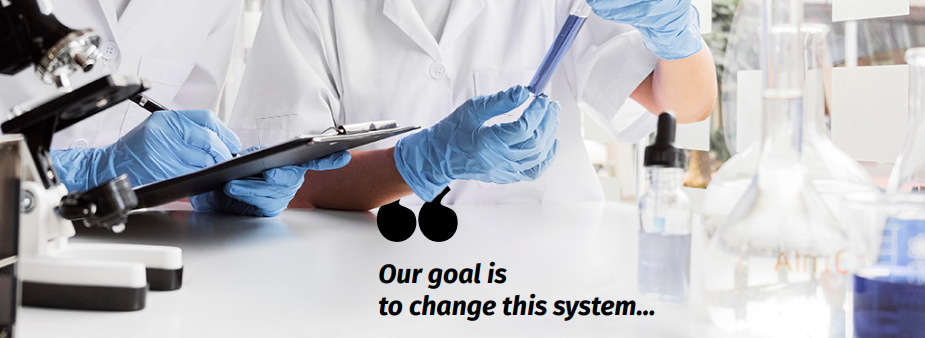
I would like to add a few words about funding. It is important to understand that the capabilities of our economy are limited, so it is very important to create conditions for attracting extra-budgetary funds from international grants, partners, and businesses.
So far, there are many obstacles to raising additional funds, including the lack of free bank accounts, a complicated procurement system, an extremely complex taxation system, etc. From one hryvnia raised from business to science, 70 percent of taxes are to be paid. Fulfilling business orders at a university or research institute is simply unprofitable. That is why whole networks of individual entrepreneurs appear around research institutions and universities, and this destroys institutions..
Our goal is to change this system.
– Let’s imagine that the year of 2027 has come and the MES team, with the support of the academia, has managed to accomplish everything they dreamed of in 2023. What would you say, looking at the research sphere that lives by new principles and rules? What will it look like?
– This is a new network of stronger institutions that have significant basic funding from the state; they have the ability to attract broad competitive funding (both from the state and internationally). They employ young people (and, accordingly, have high development potential); there is a request from the state to address specific applied problems. The number of employees, commissions placed, and new ideas is growing in these institutes.

…Ukraine is integrated into the European Research Area, and we have significantly increased the amount of funding and the percentage of funds raised from the Horizon Europe program. Every Ukrainian researcher has experience in implementing such a project…
Many of these things are written in our Action Plan. It may look like a dream today, but if a person has no dream, he/she will not achieve anything. If you have a dream, then there is a chance to make it real.
Interviewed by Svitlana Galata

